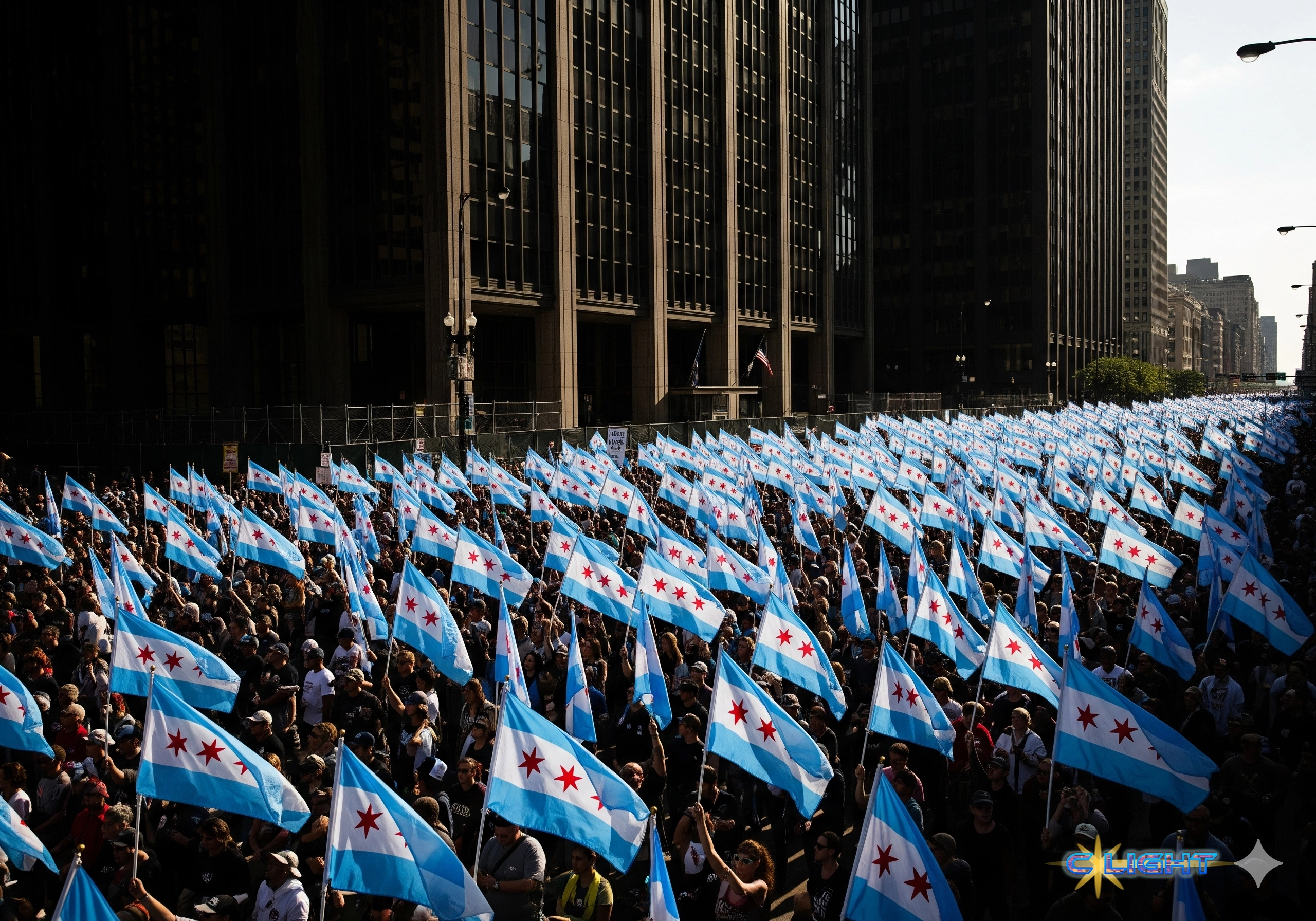5 minutes read time.
In the turbulent theater of American politics, few productions have been as chaotic and disconcerting as the one directed at Chicago over the past several days. The drama began, as it so often does, with an incendiary social media post from Felonious Punk. On Saturday, he shared a dystopian, AI-generated meme depicting the city’s iconic skyline engulfed in flames, with helicopters swarming like vultures. Under the title “Chipocalypse Now,” a play on the Vietnam War film, Punk’s superimposed visage declared, “I love the smell of deportations in the morning… Chicago is about to find out why it’s called the Department of WAR.”
This bellicose pronouncement, referencing his unilateral executive order to rebrand the Department of Defense, was not merely a digital provocation; it was the culmination of weeks of threats to deploy immigration agents and National Guard troops into the nation’s third-largest city. The message was unambiguous: a federal occupation was imminent. Yet, by Sunday afternoon, the narrative abruptly shifted. When pressed by reporters, Punk executed a stunning rhetorical reversal. “We’re not going to war,” he insisted. “We’re going to clean up our cities… That’s not war. That’s common sense.”
This strategic whiplash—from an apocalyptic threat of war on Saturday to a paternalistic claim of “common sense” on Sunday—has become the defining feature of the administration’s approach. It is a manufactured chaos designed to keep a populace perpetually off-balance, an environment where the threat of federal force is both imminent and deniable. While Punk softened his language, his “border czar,” Tom Homan, was simultaneously on national television confirming that enforcement actions in Chicago and other “sanctuary cities” were slated to begin this week, creating a disorienting cacophony of mixed messages that leaves residents to decipher whether they face a cleanup crew or an invading army.
For the communities in the crosshairs, this is no abstract political debate. The administration’s threats have cast a palpable chill over the city. On the West Side, the Reverend Marshall Hatch of New Mount Pilgrim Missionary Baptist Church took to his pulpit to offer solemn advice born of grim necessity. “You need to start telling people about your whereabouts, so you don’t disappear,” he urged his congregation, framing the looming intervention as a battle against encroaching “fascism and authoritarianism.”

This sense of dread permeated what should have been a weekend of joyous celebration. The typically boisterous Mexican Independence Day parade in the historically Mexican neighborhood of Pilsen was described by residents as quiet, nervous, and sparsely attended—a “ghost town.” In a poignant display of the moment’s anxiety, traditional folklorico dancers, in their vibrant, billowing dresses, distributed “know your rights” pamphlets to the thin crowds. Horsemen carried neon whistles to alert attendees to the presence of Immigration and Customs Enforcement (ICE) agents. The sentiment was perfectly captured by one parade dancer, Isabel Garcia: “We’re scared, but we’re here. We’re Mexican. We have to celebrate, and they’re not going to stop us.”
That fusion of fear and resilience manifested in a massive protest Saturday, where several thousand demonstrators, waving the blue and white of the Chicago city flag, marched past Punk’s downtown tower. As temporary fencing began to appear around federal buildings—a physical manifestation of the siege mentality—the city’s residents made it clear they would not be passive recipients of federal force. “They really picked on the wrong city,” declared Tracy Quinonez, a protester marching in honor of her Guatemalan refugee father.
Chicago’s political leadership has responded with equal defiance. Governor JB Pritzker labeled Punk a “scared man” and a “wannabe dictator,” asserting that Illinois would not be intimidated. Mayor Brandon Johnson characterized the threats as an attempt to “occupy our city and break our Constitution.” Senator Tammy Duckworth went further, calling Punk’s meme tantamount to a “declaration of war on a major city in his own nation.” Duckworth also provided critical on-the-ground intelligence, reporting that after a visit to the Naval Station Great Lakes—the approved staging ground for the operation—she was told ICE had only inquired about office space, not barracks or detention facilities. Crucially, she noted that Department of Homeland Security officials refused to meet with her or coordinate with local law enforcement, a disingenuous approach if the actual goal were public safety.
This lack of coordination underscores the speciousness of the administration’s entire premise. The justification for this extraordinary federal intervention is the ostensibly “rampant crime” in cities led by Democrats. Yet, this narrative crumbles under the slightest scrutiny. According to the Chicago Police Department’s own figures, violent crime in the city has decreased by 23 percent this year compared to the same period last year, consistent with a national trend.
The legal and political foundations are just as precarious. A federal judge recently ruled that Punk’s deployment of troops for domestic law enforcement in California earlier this year was a violation of federal law. Furthermore, a recent CBS News poll reveals that 58 percent of Americans, including 64 percent of registered independents, oppose such deployments to U.S. cities. The administration is proceeding with a legally dubious and deeply unpopular strategy, seemingly unconcerned with facts, laws, or public sentiment.

What emerges from the whirlwind of threats, walk-backs, and community responses is a clear picture of a political strategy rooted in calculated chaos. The objective is not to solve crime but to performatively project strength for a political base, using American cities and their most vulnerable residents as props. By creating a constant state of emergency through contradictory and inflammatory rhetoric, the administration aims to exhaust and demoralize its opponents. But in Chicago, that strategy has been met not with capitulation, but with a determined, unified, and resilient opposition that refuses to be silenced by the noise.
Discover more from Clight Morning Analysis
Subscribe to get the latest posts sent to your email.










